UN report calls on Israel to ‘end unlawful killings’ in West Bank
Lauren Irwin
Lauren Irwin
THE HILL
Thu, December 28, 2023
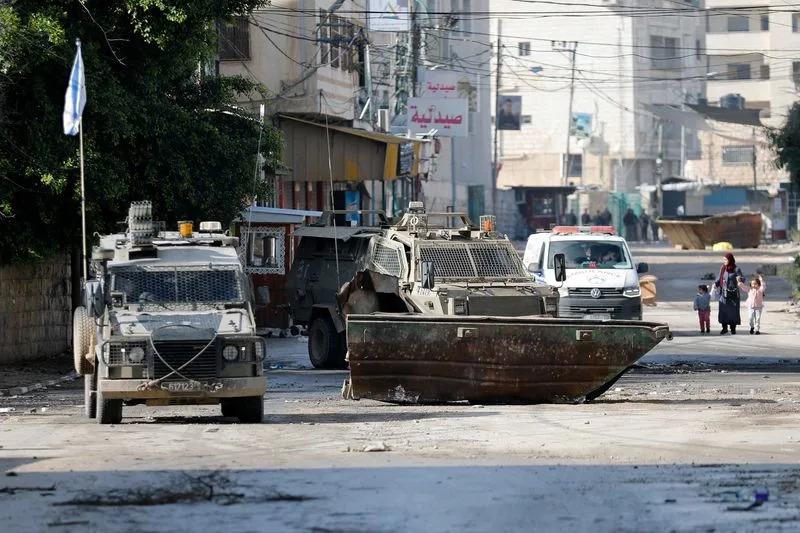
Thu, December 28, 2023

A United Nations report published Thursday details the “rapidly deteriorating human rights situation” in the West Bank and called on Israel to end the “unlawful killings” against Palestinians.
The report, published by the Office of the U.N. High Commissioner for Human Rights (OHCHR), called for an “immediate end to the use of military weapons and means during law enforcement operations” and an end to the “arbitrary detention and ill-treatment of Palestinians.”
The report found that from Oct. 7 — when Hamas invaded Israel in a surprise attack — until Dec. 27, there have been 291 Palestinian deaths in the occupied West Bank, including East Jerusalem, by the Israel Security Forces (ISF). A majority of the deaths were men, but at least 79 children have been killed in the West Bank.
At least 105 deaths were recorded during ISF law enforcement operations using airstrikes or other military tactics, and 201 were recorded during ISF operations or confrontations not involving an exchange of fire, the report said.
There were nearly 5,000 arrests that were “regularly accompanied” by physical, psychological and sexual abuse.
According to The Associated Press, over 500,00 Israelis live in settlements built in the occupied West Bank. The U.N. report found that settlers “took advantage of the permissive environment” after Oct. 7 “to accelerate displacement” and violence against Palestinian communities and expand Israeli control.
“The violations documented in this report repeat the pattern and nature of violations reported in the past in the context of the long-standing Israeli occupation of the West Bank,” U.N. High Commissioner for Human Rights, Volker Türk, said in a statement. “However, the intensity of the violence and repression is something that has not been seen in years.”
The report urged Israel’s government to take steps to end the killing of Palestinians in the West Bank to ensure use of force complies with international law. It asked that Palestinians arrested be released and to end and reverse settlement activities.
The report asked for the international community — including the Security Council, the Human Rights Council and the General Assembly — to ensure that “those responsible for settler violence are appropriately held to account” and to prevent the “further deterioration of human rights” in the West Bank and East Jerusalem.
OHCHR has also called the casualties in Gaza “appalling” and urged Israeli forces to avoid targeting civilians.
The U.N. General Assembly passed a resolution calling for a cease-fire in Gaza, where Israel has focused much of its military attention and killed approximately 20,000 people. The U.N. Security Council, which can pass legally-binding resolutions, tried to move a measure demanding Israel ceases-fire, but it was blocked by the United States.
The report, published by the Office of the U.N. High Commissioner for Human Rights (OHCHR), called for an “immediate end to the use of military weapons and means during law enforcement operations” and an end to the “arbitrary detention and ill-treatment of Palestinians.”
The report found that from Oct. 7 — when Hamas invaded Israel in a surprise attack — until Dec. 27, there have been 291 Palestinian deaths in the occupied West Bank, including East Jerusalem, by the Israel Security Forces (ISF). A majority of the deaths were men, but at least 79 children have been killed in the West Bank.
At least 105 deaths were recorded during ISF law enforcement operations using airstrikes or other military tactics, and 201 were recorded during ISF operations or confrontations not involving an exchange of fire, the report said.
There were nearly 5,000 arrests that were “regularly accompanied” by physical, psychological and sexual abuse.
According to The Associated Press, over 500,00 Israelis live in settlements built in the occupied West Bank. The U.N. report found that settlers “took advantage of the permissive environment” after Oct. 7 “to accelerate displacement” and violence against Palestinian communities and expand Israeli control.
“The violations documented in this report repeat the pattern and nature of violations reported in the past in the context of the long-standing Israeli occupation of the West Bank,” U.N. High Commissioner for Human Rights, Volker Türk, said in a statement. “However, the intensity of the violence and repression is something that has not been seen in years.”
The report urged Israel’s government to take steps to end the killing of Palestinians in the West Bank to ensure use of force complies with international law. It asked that Palestinians arrested be released and to end and reverse settlement activities.
The report asked for the international community — including the Security Council, the Human Rights Council and the General Assembly — to ensure that “those responsible for settler violence are appropriately held to account” and to prevent the “further deterioration of human rights” in the West Bank and East Jerusalem.
OHCHR has also called the casualties in Gaza “appalling” and urged Israeli forces to avoid targeting civilians.
The U.N. General Assembly passed a resolution calling for a cease-fire in Gaza, where Israel has focused much of its military attention and killed approximately 20,000 people. The U.N. Security Council, which can pass legally-binding resolutions, tried to move a measure demanding Israel ceases-fire, but it was blocked by the United States.
Reuters
Updated Thu, December 28, 2023
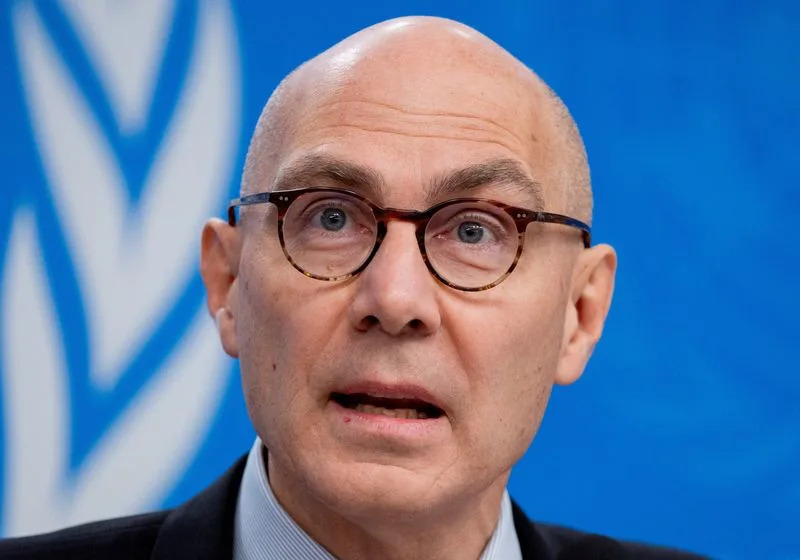
Volker Turk, United Nations High Commissioner for Human Rights, attends a news conference at the United Nations in Geneva
GENEVA (Reuters) -A United Nations report published on Thursday deplored what it called a "rapid deterioration" of human rights in the Israeli-occupied West Bank and urged Israeli authorities to end violence against the Palestinian population there.
The report by the Office of the U.N. High Commissioner for Human Rights (OHCHR) said 300 Palestinians had been killed in the West Bank since Oct. 7, the day Hamas gunmen went on a deadly rampage into southern Israel from Gaza and took hostages back to the Palestinian enclave.
Most of the West Bank killings occurred during operations by Israeli security forces or confrontations with them.
At least 105 deaths could be attributed to Israeli operations involving air strikes or other military tactics in refugee camps or other densely-populated areas. At least eight people were killed by Jewish settlers, it said.
Tal Heinrich, a spokesperson for the Israeli Prime Minister's Office, dismissed the report as "quite ridiculous".
"It completely belittles the major security threats to Israelis emerging from Judea and Samaria," she said, referring to the West Bank by its Hebrew biblical names.
"Yes, we arrested hundreds of terror suspects in that area and we will continue to do whatever it takes to maintain our security."
Volker Turk, the U.N. High Commissioner for Human Rights, said the use of unnecessary or disproportionate force against Palestinians in the West Bank was "extremely troubling".
"I call on Israel to take immediate, clear and effective steps to put an end to settler violence against the Palestinian population, to investigate all incidents of violence by settlers and Israeli security forces, to ensure effective protection of Palestinian communities," he said.
The OHCHR said it had also recorded mass arbitrary detentions, unlawful detentions and cases of reported torture and other forms of ill-treatment of Palestinian detainees. It said some 4,785 Palestinians had been detained in the West Bank since Oct. 7.
"Some were stripped naked, blindfolded and restrained for long hours with handcuffs and with their legs tied, while Israeli soldiers stepped on their heads and backs, were spat at, slammed against walls, threatened, insulted, humiliated and in some cases subjected to sexual and gender-based violence," an OHCHR statement about the report said.
Israel's military has said it operates against suspected militants in the West Bank and that investigations have been launched into cases of possible ill treatment of detainees.
The West Bank had already been experiencing the highest levels of unrest in decades during the 18 months preceding the Oct. 7 attack on Israel by Hamas gunmen, but confrontations have risen sharply after Israel launched a ground invasion of Gaza.
(Reporting by Gabrielle Tétrault-Farber; additional reporting by Maayan Lubell; editing by Mark Heinrich)
The Jewish settlers 'living the American dream' in the West Bank
Rebecca Rommen
Thu, December 28, 2023

Women wave American and Israeli flags from a car window as they join a convoy to the U.S. Embassy in Jerusalem to show support for U.S. President Donald Trump, ahead of the upcoming U.S. election, in Jerusalem October 27, 2020.REUTERS/Ammar Awad
Tens of thousands of US Jews live in West Bank settlements.
The October 7 Hamas terrorist attacks on Israel have sparked backlash in the West Bank.
Settler violence has been dubbed an "American problem."
"I'm living the American dream in Israel," Judith Segaloff told Business Insider.
Segaloff is a US-born settler living in the West Bank, a territory that Israel occupied after the Six-Day War in 1967. She was born into a Jewish family in New Jersey. She was brought up with Zionist values but did not visit Israel until she was in her 40s.
She said she finally felt she'd come home when she stepped off the plane on her first trip to Israel.
"This is where my protoplasm belongs," she said. "It's where I come from."
She and her family now live in Karnei Shomron, an Israeli West Bank settlement established in 1977. An Israeli flag is draped over the entryway of their house.
"We're in the suburbs," Segaloff said, "and it feels like a bedroom community."
She said her neighborhood was reminiscent of Westchester, New York, which she once called home.
"Like Westchester, we have a big house— much bigger than we would have anywhere else in the country," she said. "We have a lot of land, a big backyard, and there's people that speak English all over."
A new life in the West Bank does not mean Segaloff has shed her roots.
"I embrace my American background," she said. "I embrace my Americanism. But at the same time, I'm Israeli all the way."
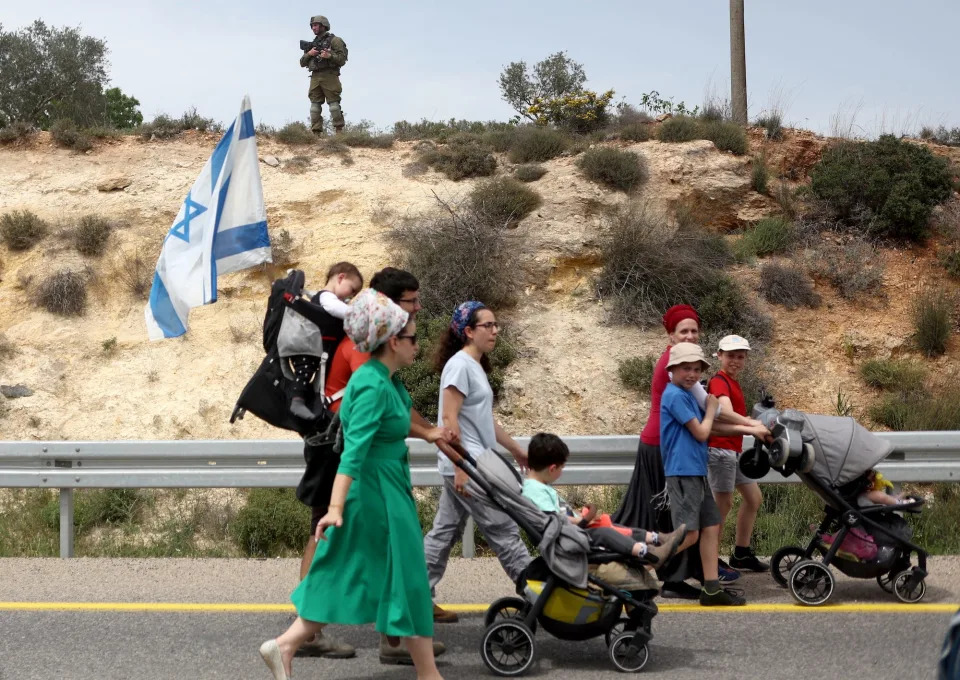
Israeli settlers hold a protest march from Tapuach Junction to the Israeli settler outpost of Evyatar, in the Israeli-occupied West Bank, April 10, 2023.NIR ELIAS/Reuters
US-born settlers are "overrepresented" in the West Bank, Sara Yael Hirschhorn, a historian and a political analyst working as a visiting professor at Israel's University of Haifa, said.
She told BI there's a higher proportion of residents with American roots in the West Bank settlements than in Israel proper — about 15% versus 1%.
While Segaloff presents the life of an American-born Jewish settler as idyllic, beyond the perimeter of Karnei Shomron — "a beautiful town in Western Samaria," the town's public-relations blurb says — a nightmare has been unfolding for some Palestinian residents of the West Bank.
The October 7 Hamas terrorist attacks on southern Israel have sparked a backlash in the West Bank. Violence against Palestinian communities by extremist Jewish settlers has surged, who committed more than 343 violent attacks and killed eight Palestinian civilians, prompting a rare international reaction.
Recently, Antony Blinken, the US secretary of state, announced that the Biden administration would impose visa bans on extremist Jewish settlers complicit in violence against Palestinians in the West Bank. The UK government has followed with a similar measure.
Settler violence has been dubbed an "American problem," considering the significant number of US-born people living in Israeli settlements.
The totemic moment of the "American problem" was the Cave of the Patriarchs massacre that killed 29 Palestinians in 1994 in the West Bank city of Hebron, perpetrated by Baruch Goldstein, a Jewish doctor and settler extremist from Brooklyn, New York.
In an op-ed for The New York Times decrying "Israeli terrorists, born in the USA," Hirschhorn noted that in the aftermath of the Hebron massacre former Israeli President Chaim Herzog called the US "a breeding ground" for Jewish terror.
Accusations of settler violence are met with counterclaims of frequent attacks by Palestinians on Jews living beyond the Green Line (the pre-1967 Israeli border), including rocks thrown regularly at cars, ramming attacks, and drive-by shootings.
'Manifest destiny'
According to 2015 research by Hirschhorn for Oxford University, an estimated 60,000 American Jews lived in West Bank settlements.
Hirschhorn said that these figures didn't count suburban neighborhoods of Jerusalem over the Green Line and the number could be much higher.
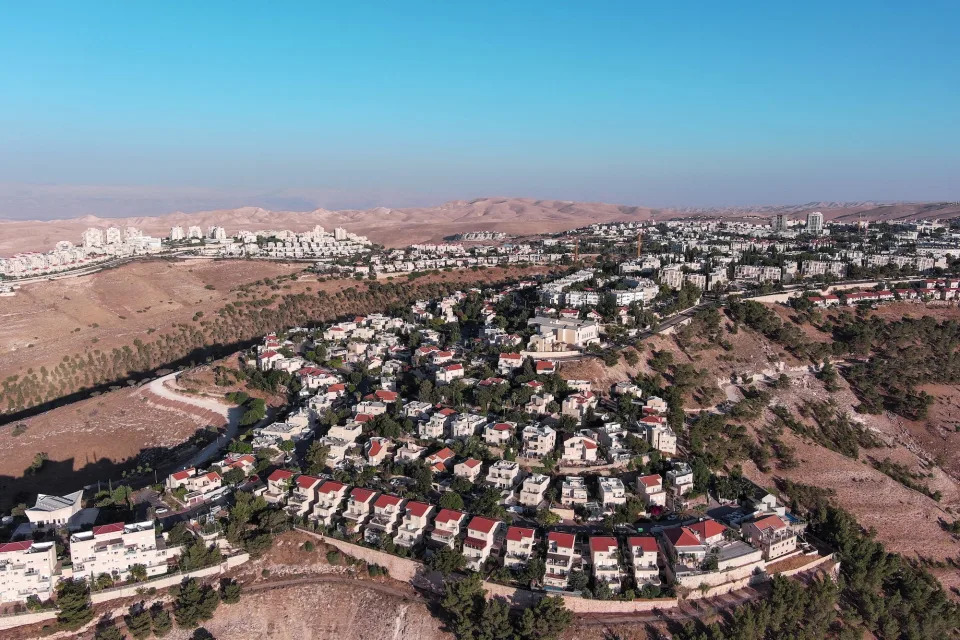
An aerial view shows the Jewish settlement of Maale Adumim in the Israeli-occupied West Bank, June 25, 2023.REUTERS/Ilan Rosenberg
The attraction to the West Bank is partly associational, Hirschhorn told BI. Once Americans have relatives, friends, or former coworkers who have made aliyah to the West Bank, it seems a logical place for them to settle, too.
Segaloff's decision to move to Karnei Shomron was not just due to the quality of life the settlement could offer her but also because she wanted to live near her cousins who were already established there.
Hirschhorn, who wrote "City on a Hilltop: American Jews and the Israeli Settler Movement," said that US settlers brought ideas of pioneering and building utopian communities to the West Bank, in line with the "manifest destiny" ideology.
Manifest destiny was the 19th-century belief that the US was destined to take over the world and was used to justify the near-eradication of Native American society.
Segaloff said she and her husband described their fellow settlers as "plucky," akin to the American settlers who were "pushing out to Oregon and the West when Native Americans were attacking them."
The Jewish settlements are evocative of American expansionism, Hirschhorn said, with "Americanized" characteristics: The West Bank communities have familiar bagel shops, huge supermarkets, and all the amenities you would hope to find in an American suburb.
"They have all the kinds of creature comforts that you can imagine people might want, in America as much as in Israel," Hirschhorn said.
"You could get a lot for your money out here," Segaloff said. "It's like raising your kids in a small town, and it's a wonderful feeling."
Living in a bubble
Dror Sadot, a spokesperson for B'Tselem, a Jerusalem nonprofit addressing human-rights violations in the Israeli-occupied Palestinian territories, told BI that all settlements in the territories were illegal under international law but that Israeli law distinguished between legal and illegal settlements.
Sadot said settlers were exploiting Israel's war against Hamas in Gaza to complete their goal of dominating the West Bank, which the Jewish settlers refer to as Judea and Samaria, biblical descriptions.
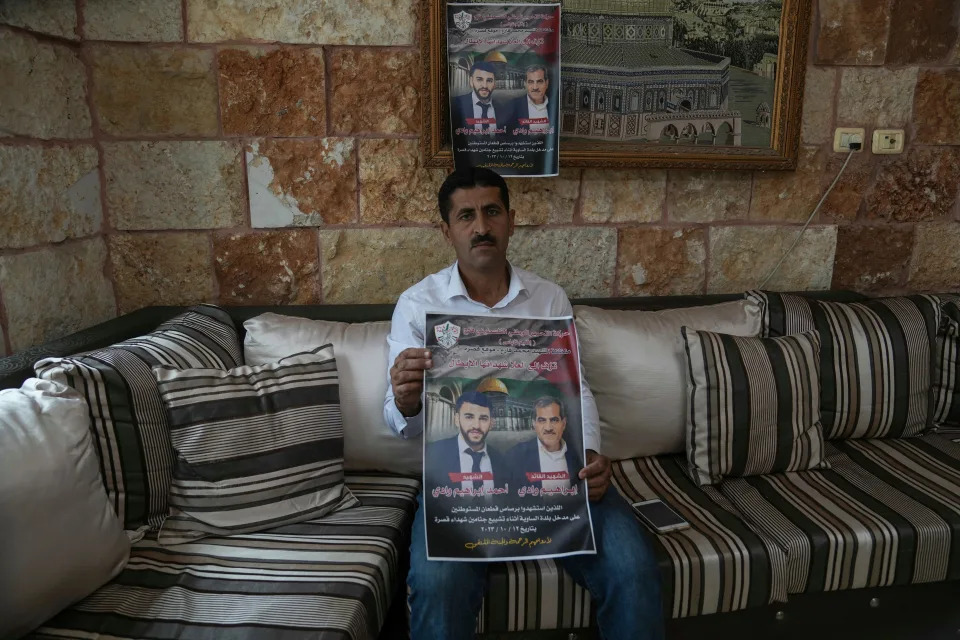
Abdelazim Wadi holds up a poster commemorating his brother, Ibrahim Wadi, and his nephew, Ahmed Wadi, who were killed by Israeli settlers during a funeral procession on Oct. 12, in the rural Palestinian village of Qusra, West Bank.AP/Mahmoud Illean
Since Hamas attacked Israel on October 7, settler violence against Palestinians in the West Bank has soared, according to B'Tselem. Israeli forces and settlers have also been forcing Palestinians out of their West Bank homes, reported the United Nations Office for the Coordination of Humanitarian Affairs.
Segaloff said that despite the increased violence in the West Bank, her family's suburbanlike utopia was intact.
"We haven't had any sirens here, thank God," she said. "We're living in, like, a bubble."
Naomi Kahn, a Jewish woman and the director of the International Division at Regavim — a pro-settler think tank and lobbying group — works on the legality of the settlements under Israeli jurisdiction.
Kahn was born, raised, and educated in the US. She studied at New York University and moved to Israel in 1984. She said she made aliyah because "this is where we belong, as the only place we've ever belonged and the only place that's belonged to us.
"So that's why I'm here," she added. "I want to be part of Jewish history and not a bystander watching it misreported in American media."
Kahn told BI that Regavim had "dialogue with anyone who will have dialogue with us." She added: "In general, the Palestinians in the region, in Area C, do not have dialogue with us. They have their own agenda, which is anathema to Israel's national interest."
Area C covers 60% of the West Bank and comprises 125 settlements, with about 325,500 settlers, according to B'Tselem. The area has about 180,000 to 300,000 Palestinian inhabitants.
Kahn disagreed with the term "settlements," saying: "There were never preexisting Arab settlements or communities of any kind on the land on which any of the Jewish communities of Judea and Samaria are built."
Nearly 1,000 Palestinians have been displaced from their homes in the West Bank amid intensified settler violence and increased movement restrictions since October 7, a November assessment from the UN Office for the Coordination of Humanitarian Affairs said.
D'vora Brand, originally from Brooklyn, is a real-estate agent in the West Bank. She told BI that she had never sold a house that was forcibly taken from Palestinians.
Segaloff said of her home: "No Palestinian has ever lived in this house."
'This is the biblical heartland of Israel'
Sharon Rosenbluth, whose father was a Holocaust survivor, was born in a small Illinois town before relocating to Maryland.
"From the time I can remember, Israel was always the forefront," she said. Her parents were "extremely Zionistic," she added.
During her childhood, she and her family spent a year in Israel while her father taught at a university. They lived there during the 1973 Yom Kippur War, in which an Arab coalition led by Egypt and Syria attacked Israel.
"I was 5 years old," she said. "I remember going to school being escorted by soldiers."
Rosenbluth is a fellow resident of Segaloff's in Karnei Shomron. The community's website says the settlement includes "a 'North American' neighborhood, Neve Aliza," one of the largest concentrations of North American immigrants in Israel.
"We're not settlers because it's not possible," Rosenbluth said. "It's our own land. So we call ourselves citizens of the State of Israel because we firmly believe that this is the biblical heartland of Israel and that it belongs to us."
Rebecca Rommen
Thu, December 28, 2023

Women wave American and Israeli flags from a car window as they join a convoy to the U.S. Embassy in Jerusalem to show support for U.S. President Donald Trump, ahead of the upcoming U.S. election, in Jerusalem October 27, 2020.REUTERS/Ammar Awad
Tens of thousands of US Jews live in West Bank settlements.
The October 7 Hamas terrorist attacks on Israel have sparked backlash in the West Bank.
Settler violence has been dubbed an "American problem."
"I'm living the American dream in Israel," Judith Segaloff told Business Insider.
Segaloff is a US-born settler living in the West Bank, a territory that Israel occupied after the Six-Day War in 1967. She was born into a Jewish family in New Jersey. She was brought up with Zionist values but did not visit Israel until she was in her 40s.
She said she finally felt she'd come home when she stepped off the plane on her first trip to Israel.
"This is where my protoplasm belongs," she said. "It's where I come from."
She and her family now live in Karnei Shomron, an Israeli West Bank settlement established in 1977. An Israeli flag is draped over the entryway of their house.
"We're in the suburbs," Segaloff said, "and it feels like a bedroom community."
She said her neighborhood was reminiscent of Westchester, New York, which she once called home.
"Like Westchester, we have a big house— much bigger than we would have anywhere else in the country," she said. "We have a lot of land, a big backyard, and there's people that speak English all over."
A new life in the West Bank does not mean Segaloff has shed her roots.
"I embrace my American background," she said. "I embrace my Americanism. But at the same time, I'm Israeli all the way."

Israeli settlers hold a protest march from Tapuach Junction to the Israeli settler outpost of Evyatar, in the Israeli-occupied West Bank, April 10, 2023.NIR ELIAS/Reuters
US-born settlers are "overrepresented" in the West Bank, Sara Yael Hirschhorn, a historian and a political analyst working as a visiting professor at Israel's University of Haifa, said.
She told BI there's a higher proportion of residents with American roots in the West Bank settlements than in Israel proper — about 15% versus 1%.
While Segaloff presents the life of an American-born Jewish settler as idyllic, beyond the perimeter of Karnei Shomron — "a beautiful town in Western Samaria," the town's public-relations blurb says — a nightmare has been unfolding for some Palestinian residents of the West Bank.
The October 7 Hamas terrorist attacks on southern Israel have sparked a backlash in the West Bank. Violence against Palestinian communities by extremist Jewish settlers has surged, who committed more than 343 violent attacks and killed eight Palestinian civilians, prompting a rare international reaction.
Recently, Antony Blinken, the US secretary of state, announced that the Biden administration would impose visa bans on extremist Jewish settlers complicit in violence against Palestinians in the West Bank. The UK government has followed with a similar measure.
Settler violence has been dubbed an "American problem," considering the significant number of US-born people living in Israeli settlements.
The totemic moment of the "American problem" was the Cave of the Patriarchs massacre that killed 29 Palestinians in 1994 in the West Bank city of Hebron, perpetrated by Baruch Goldstein, a Jewish doctor and settler extremist from Brooklyn, New York.
In an op-ed for The New York Times decrying "Israeli terrorists, born in the USA," Hirschhorn noted that in the aftermath of the Hebron massacre former Israeli President Chaim Herzog called the US "a breeding ground" for Jewish terror.
Accusations of settler violence are met with counterclaims of frequent attacks by Palestinians on Jews living beyond the Green Line (the pre-1967 Israeli border), including rocks thrown regularly at cars, ramming attacks, and drive-by shootings.
'Manifest destiny'
According to 2015 research by Hirschhorn for Oxford University, an estimated 60,000 American Jews lived in West Bank settlements.
Hirschhorn said that these figures didn't count suburban neighborhoods of Jerusalem over the Green Line and the number could be much higher.

An aerial view shows the Jewish settlement of Maale Adumim in the Israeli-occupied West Bank, June 25, 2023.REUTERS/Ilan Rosenberg
The attraction to the West Bank is partly associational, Hirschhorn told BI. Once Americans have relatives, friends, or former coworkers who have made aliyah to the West Bank, it seems a logical place for them to settle, too.
Segaloff's decision to move to Karnei Shomron was not just due to the quality of life the settlement could offer her but also because she wanted to live near her cousins who were already established there.
Hirschhorn, who wrote "City on a Hilltop: American Jews and the Israeli Settler Movement," said that US settlers brought ideas of pioneering and building utopian communities to the West Bank, in line with the "manifest destiny" ideology.
Manifest destiny was the 19th-century belief that the US was destined to take over the world and was used to justify the near-eradication of Native American society.
Segaloff said she and her husband described their fellow settlers as "plucky," akin to the American settlers who were "pushing out to Oregon and the West when Native Americans were attacking them."
The Jewish settlements are evocative of American expansionism, Hirschhorn said, with "Americanized" characteristics: The West Bank communities have familiar bagel shops, huge supermarkets, and all the amenities you would hope to find in an American suburb.
"They have all the kinds of creature comforts that you can imagine people might want, in America as much as in Israel," Hirschhorn said.
"You could get a lot for your money out here," Segaloff said. "It's like raising your kids in a small town, and it's a wonderful feeling."
Living in a bubble
Dror Sadot, a spokesperson for B'Tselem, a Jerusalem nonprofit addressing human-rights violations in the Israeli-occupied Palestinian territories, told BI that all settlements in the territories were illegal under international law but that Israeli law distinguished between legal and illegal settlements.
Sadot said settlers were exploiting Israel's war against Hamas in Gaza to complete their goal of dominating the West Bank, which the Jewish settlers refer to as Judea and Samaria, biblical descriptions.

Abdelazim Wadi holds up a poster commemorating his brother, Ibrahim Wadi, and his nephew, Ahmed Wadi, who were killed by Israeli settlers during a funeral procession on Oct. 12, in the rural Palestinian village of Qusra, West Bank.AP/Mahmoud Illean
Since Hamas attacked Israel on October 7, settler violence against Palestinians in the West Bank has soared, according to B'Tselem. Israeli forces and settlers have also been forcing Palestinians out of their West Bank homes, reported the United Nations Office for the Coordination of Humanitarian Affairs.
Segaloff said that despite the increased violence in the West Bank, her family's suburbanlike utopia was intact.
"We haven't had any sirens here, thank God," she said. "We're living in, like, a bubble."
Naomi Kahn, a Jewish woman and the director of the International Division at Regavim — a pro-settler think tank and lobbying group — works on the legality of the settlements under Israeli jurisdiction.
Kahn was born, raised, and educated in the US. She studied at New York University and moved to Israel in 1984. She said she made aliyah because "this is where we belong, as the only place we've ever belonged and the only place that's belonged to us.
"So that's why I'm here," she added. "I want to be part of Jewish history and not a bystander watching it misreported in American media."
Kahn told BI that Regavim had "dialogue with anyone who will have dialogue with us." She added: "In general, the Palestinians in the region, in Area C, do not have dialogue with us. They have their own agenda, which is anathema to Israel's national interest."
Area C covers 60% of the West Bank and comprises 125 settlements, with about 325,500 settlers, according to B'Tselem. The area has about 180,000 to 300,000 Palestinian inhabitants.
Kahn disagreed with the term "settlements," saying: "There were never preexisting Arab settlements or communities of any kind on the land on which any of the Jewish communities of Judea and Samaria are built."
Nearly 1,000 Palestinians have been displaced from their homes in the West Bank amid intensified settler violence and increased movement restrictions since October 7, a November assessment from the UN Office for the Coordination of Humanitarian Affairs said.
D'vora Brand, originally from Brooklyn, is a real-estate agent in the West Bank. She told BI that she had never sold a house that was forcibly taken from Palestinians.
Segaloff said of her home: "No Palestinian has ever lived in this house."
'This is the biblical heartland of Israel'
Sharon Rosenbluth, whose father was a Holocaust survivor, was born in a small Illinois town before relocating to Maryland.
"From the time I can remember, Israel was always the forefront," she said. Her parents were "extremely Zionistic," she added.
During her childhood, she and her family spent a year in Israel while her father taught at a university. They lived there during the 1973 Yom Kippur War, in which an Arab coalition led by Egypt and Syria attacked Israel.
"I was 5 years old," she said. "I remember going to school being escorted by soldiers."
Rosenbluth is a fellow resident of Segaloff's in Karnei Shomron. The community's website says the settlement includes "a 'North American' neighborhood, Neve Aliza," one of the largest concentrations of North American immigrants in Israel.
"We're not settlers because it's not possible," Rosenbluth said. "It's our own land. So we call ourselves citizens of the State of Israel because we firmly believe that this is the biblical heartland of Israel and that it belongs to us."
'Trump got us'
Hirschhorn said the West Bank settlements were "often considered to be a right-wing project" and recalled how the Trump campaign set up an ad hoc office in Karnei Shomron before the 2016 election.
President Donald Trump recognized Jerusalem as Israel's capital and ordered the US Embassy to relocate there, in a move that validated American Israelis in the region.
"Trump got us," Segaloff told BI's Joshua Zitser last year. "He understood us in a way that no other president ever did. He understands the Middle East mentality, the trading mentality, the negotiating mentality."
The settlers reject the idea that land can be traded for peace with the Palestinians.
"This is not an occupation," Kahn said. "And what we're up against is not something that can be solved by territorial compromise."
"I'll stay here no matter what," Segaloff said. "Pushing for a two-state solution is ridiculous because we can't live with people who want us dead."
No comments:
Post a Comment